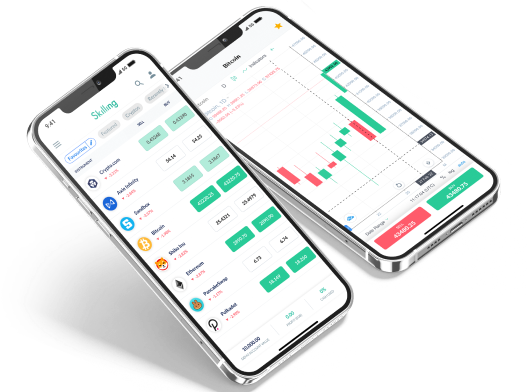Trade balance is a key economic indicator that traders and investors closely monitor. This article will explain what trade balance is, how it functions, its significance for traders, and answer some frequently asked questions. Understanding the trade balance can provide valuable insights into market trends and economic health, essential for informed trading decisions.
Experience Skilling's award-winning platform
Try out any of Skilling’s trading platforms on the device of your choice across web, android or iOS.

What is the trade balance?
The trade balance is a measure of a country's exports minus its imports. It is an essential component of a nation's balance of payments and provides insight into its economic standing. A positive trade balance, or surplus, occurs when a country exports more than it imports. A negative trade balance, or deficit, happens when imports exceed exports.
- Trade surplus: When a country exports more than it imports, it has a trade surplus, indicating a net inflow of domestic currency from foreign markets.
- Trade deficit: Conversely, a trade deficit occurs when a country imports more than it exports, leading to a net outflow of domestic currency.
The trade balance reflects a country's competitiveness, productivity, and economic health, it’s a direct indicator of a country's trading position in the global market:
How does it work?
The trade balance works as a key indicator of a nation's economic activity:
- Exports and imports: It involves calculating the total value of a country's exported goods and services and subtracting the total value of its imported goods and services over a specific period.
- Currency value: The trade balance can influence the value of a nation's currency. A surplus typically strengthens a currency, while a deficit can weaken it.
- Government policies: Trade policies, tariffs, and political relations can significantly impact the trade balance.
- Global economic conditions: Global demand and supply, economic stability, and international trade agreements also play a crucial role.
Why is it important for traders?
Understanding the trade balance is crucial for traders for several reasons:
- Currency valuation: The trade balance can significantly impact currency values, which is vital for Forex traders.
- Economic health indicator: It serves as an indicator of a country's economic health, influencing stock and bond markets.
- Investment decisions: Traders use trade balance data to gauge the economic trends of a country, which can inform investment decisions in various sectors.
- Predicting market movements: Changes in the trade balance can lead to shifts in market sentiment, affecting commodity prices, stock indices, and interest rates.
- Risk management: By understanding the implications of trade balance figures, traders can better manage risks associated with currency fluctuations and market volatility.
Curious about Forex trading? Time to take action!
Use our free demo account to practise trading 70+ different Forex pairs without risking real cash.

FAQs
1. How does trade balance affect global trade relations?
Trade balance can influence a country's trade relations. Persistent imbalances can lead to trade disputes or negotiations for more favourable trade agreements.
2. Can a trade surplus always be seen as positive?
While generally favourable, a surplus can also indicate a lack of domestic demand, potentially signalling economic issues.
3. How do external factors like global crises impact trade balance?
Global crises can disrupt trade flows, affecting both imports and exports and lead to significant changes in the trade balance.
4. Is trade balance more important for certain types of traders?
Trade balance data is particularly crucial for forex traders and those involved in international investments, as it directly impacts currency values and international market dynamics.
5. How frequently is trade balance data released?
Trade balance data is typically released monthly by governmental or international economic organisations.
6. Can a consistent trade deficit harm a country's economy?
While a trade deficit can indicate economic issues, it's not always harmful. It depends on the country's overall economic context and how it finances its deficit.
7. How does a trade surplus affect a country's currency?
A trade surplus often leads to a higher demand for the country's currency, potentially strengthening its value.
8. Should traders rely solely on trade balance data for decision-making?
While important, trade balance is just one of many economic indicators. Traders should consider a range of data for a comprehensive analysis.











